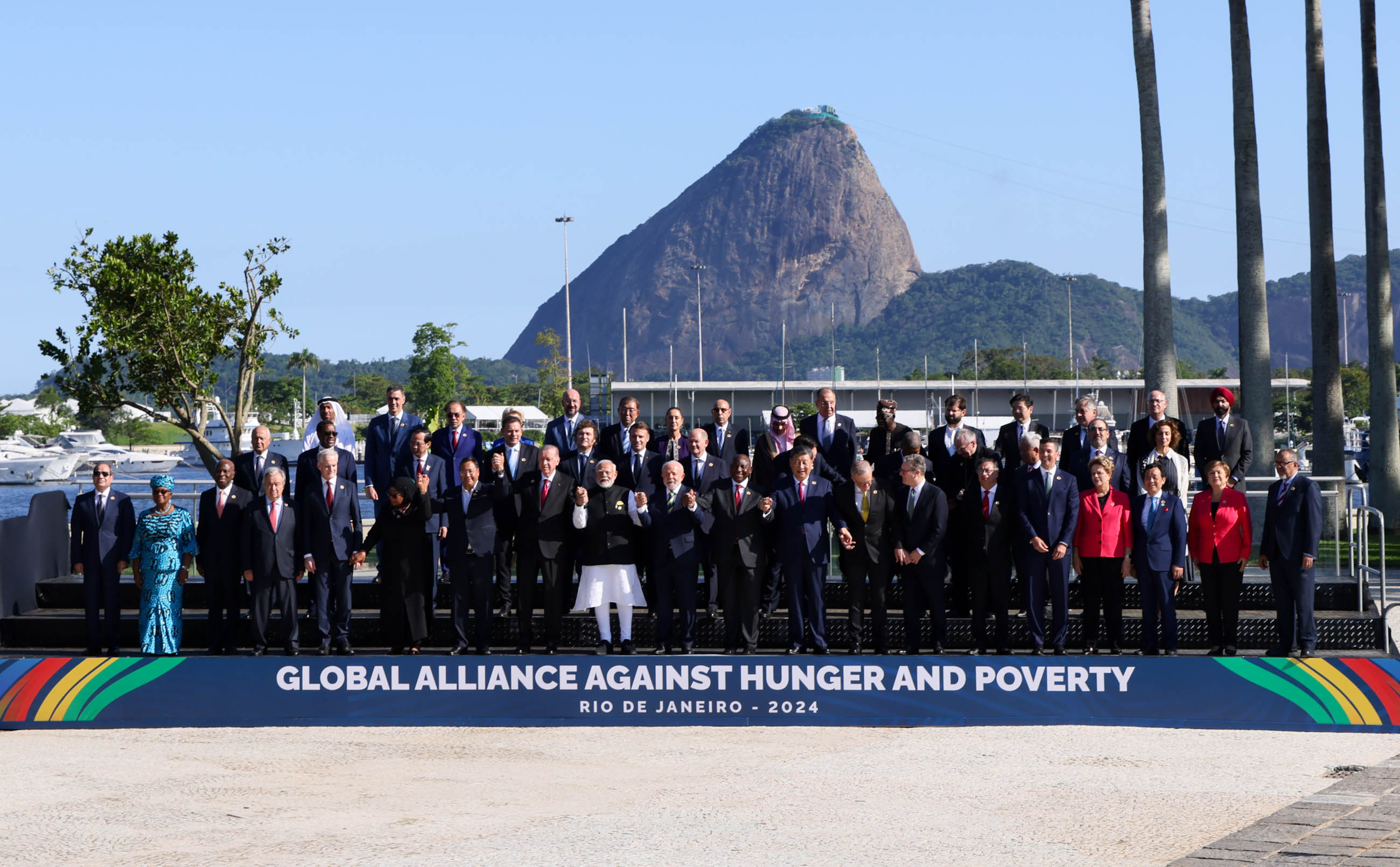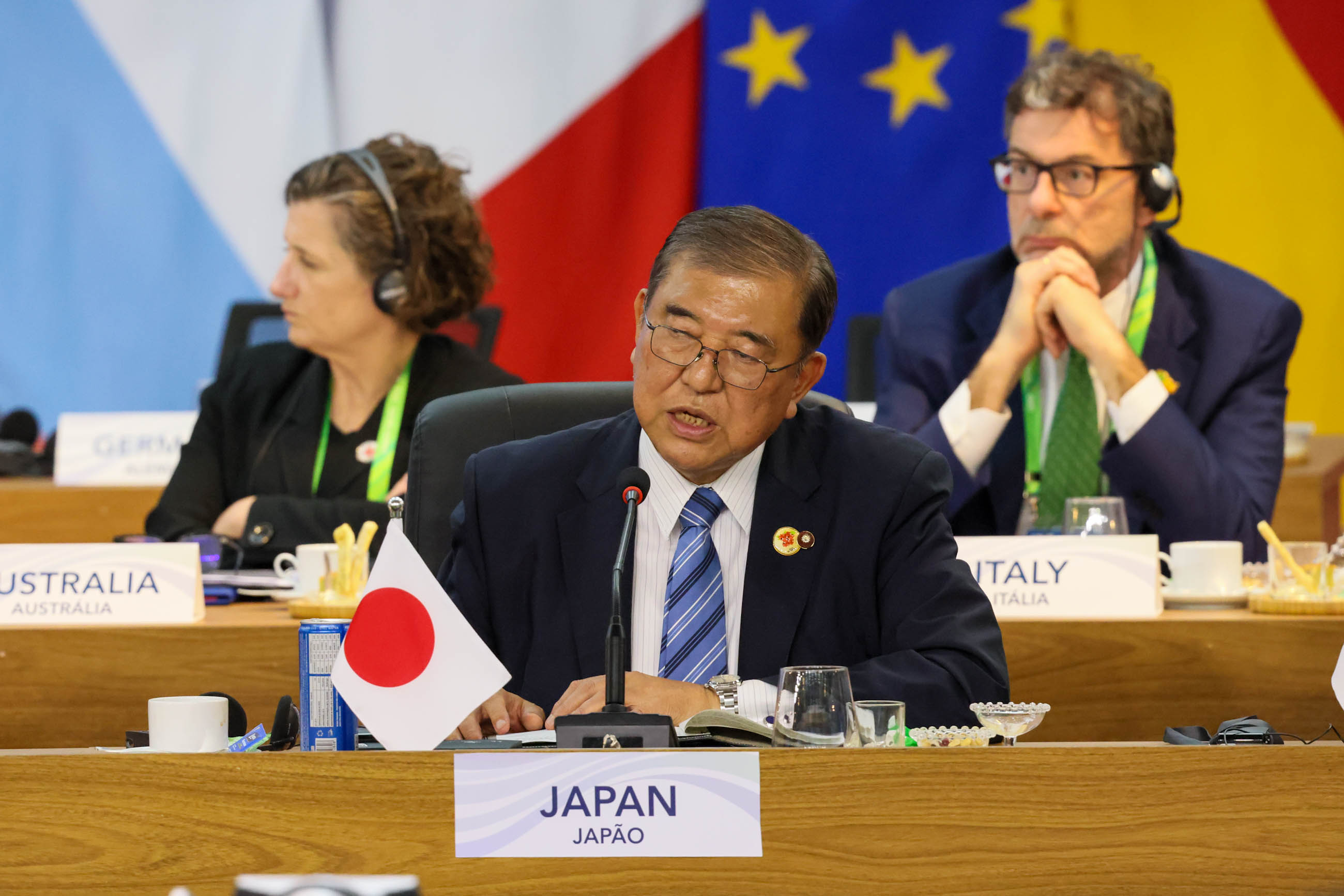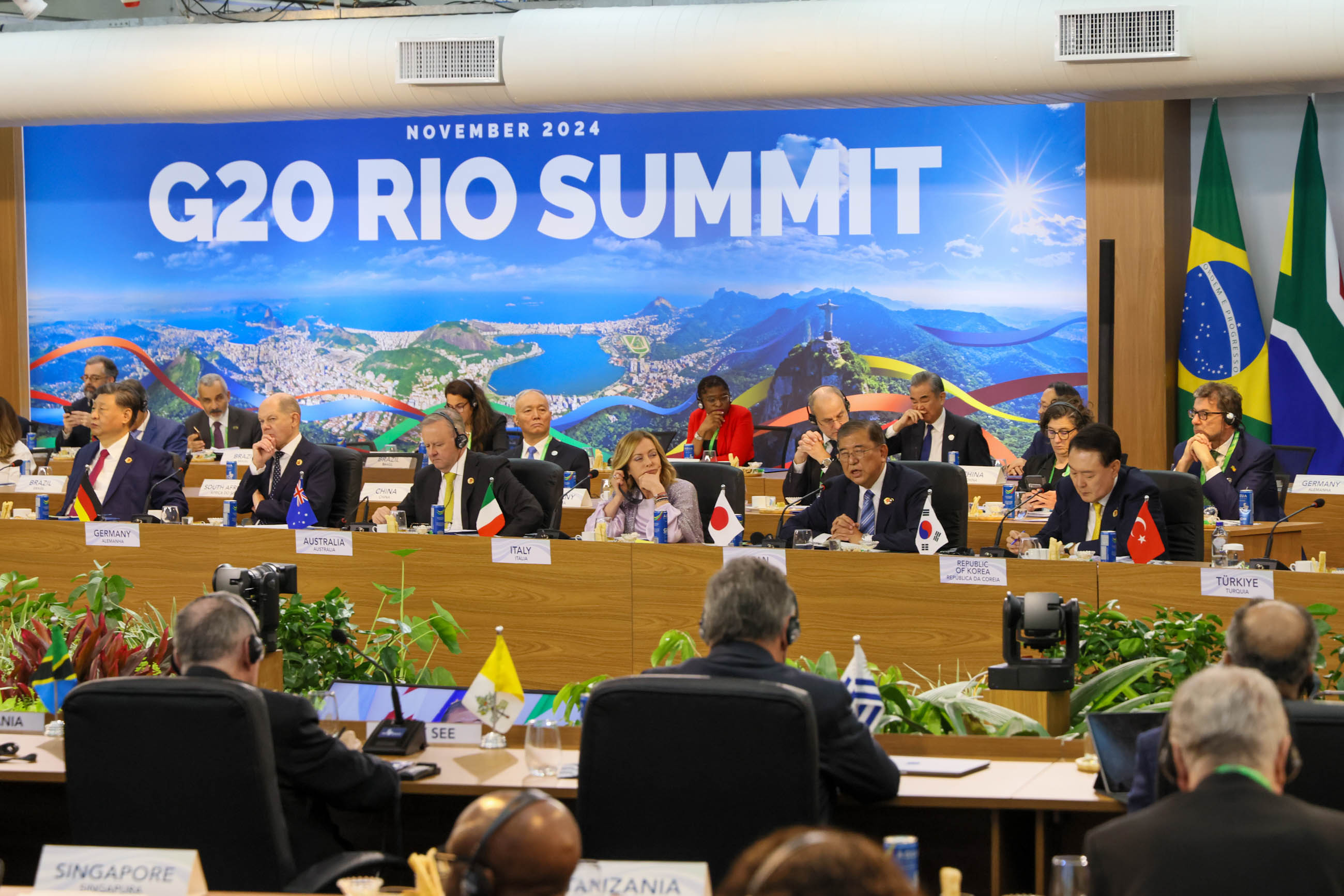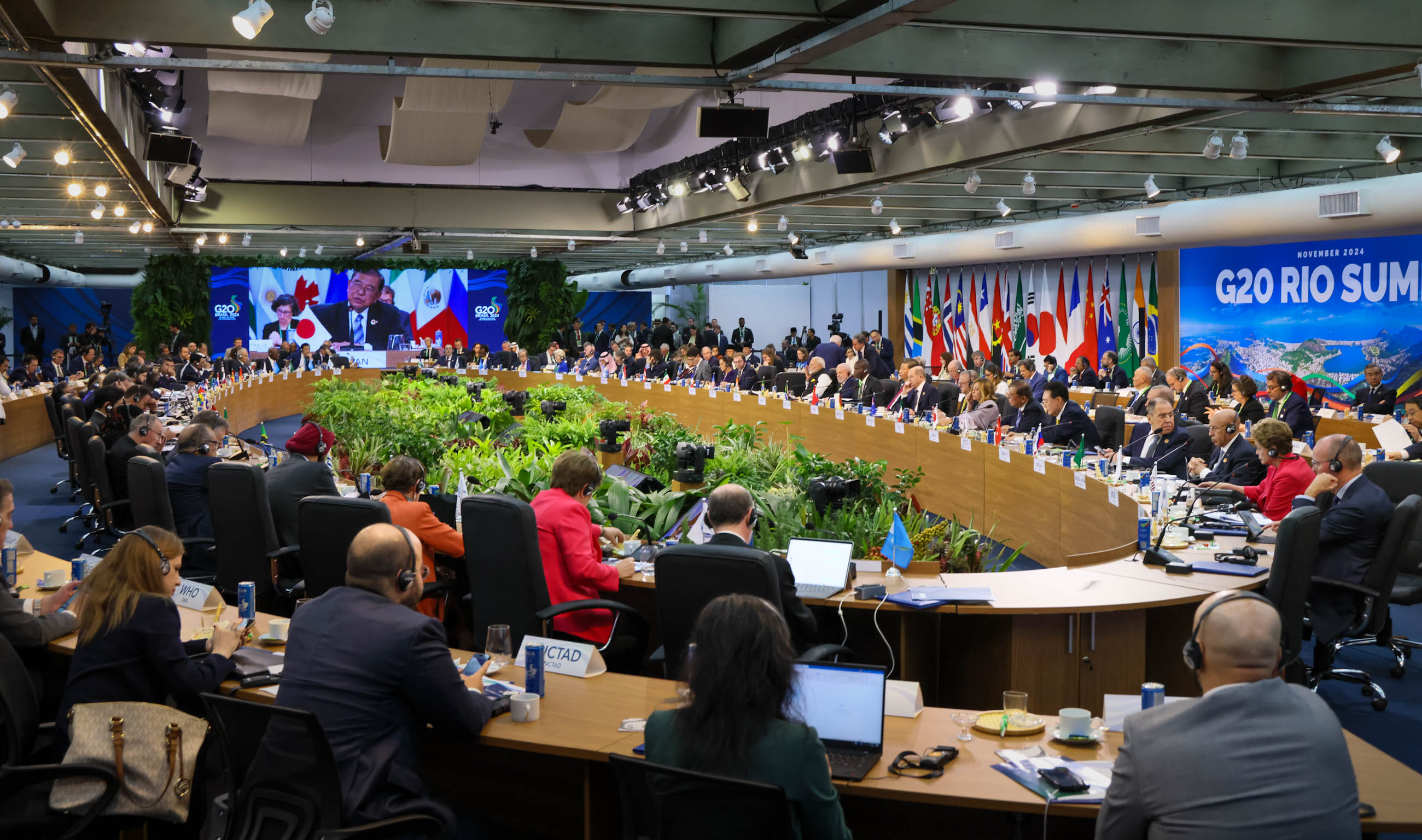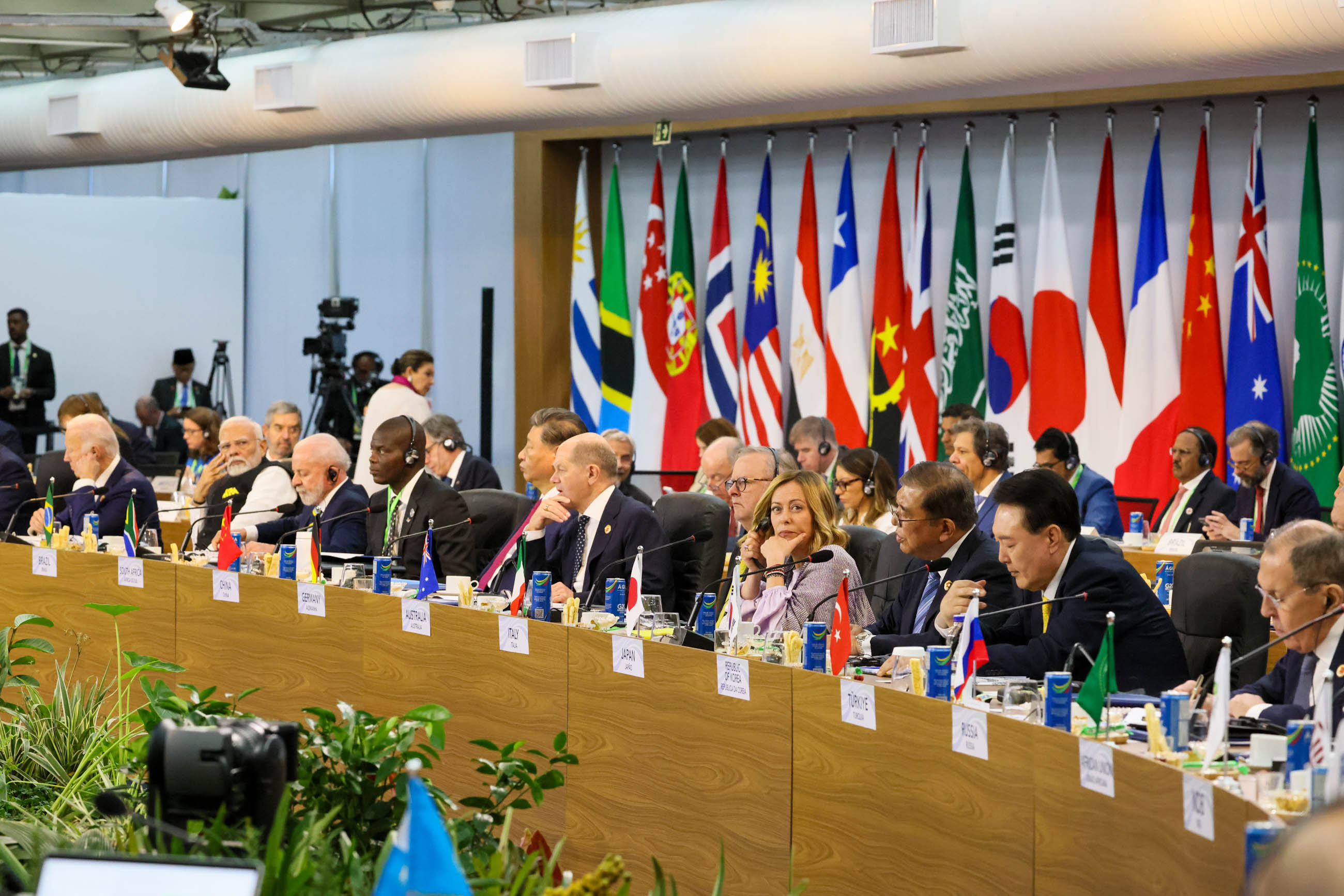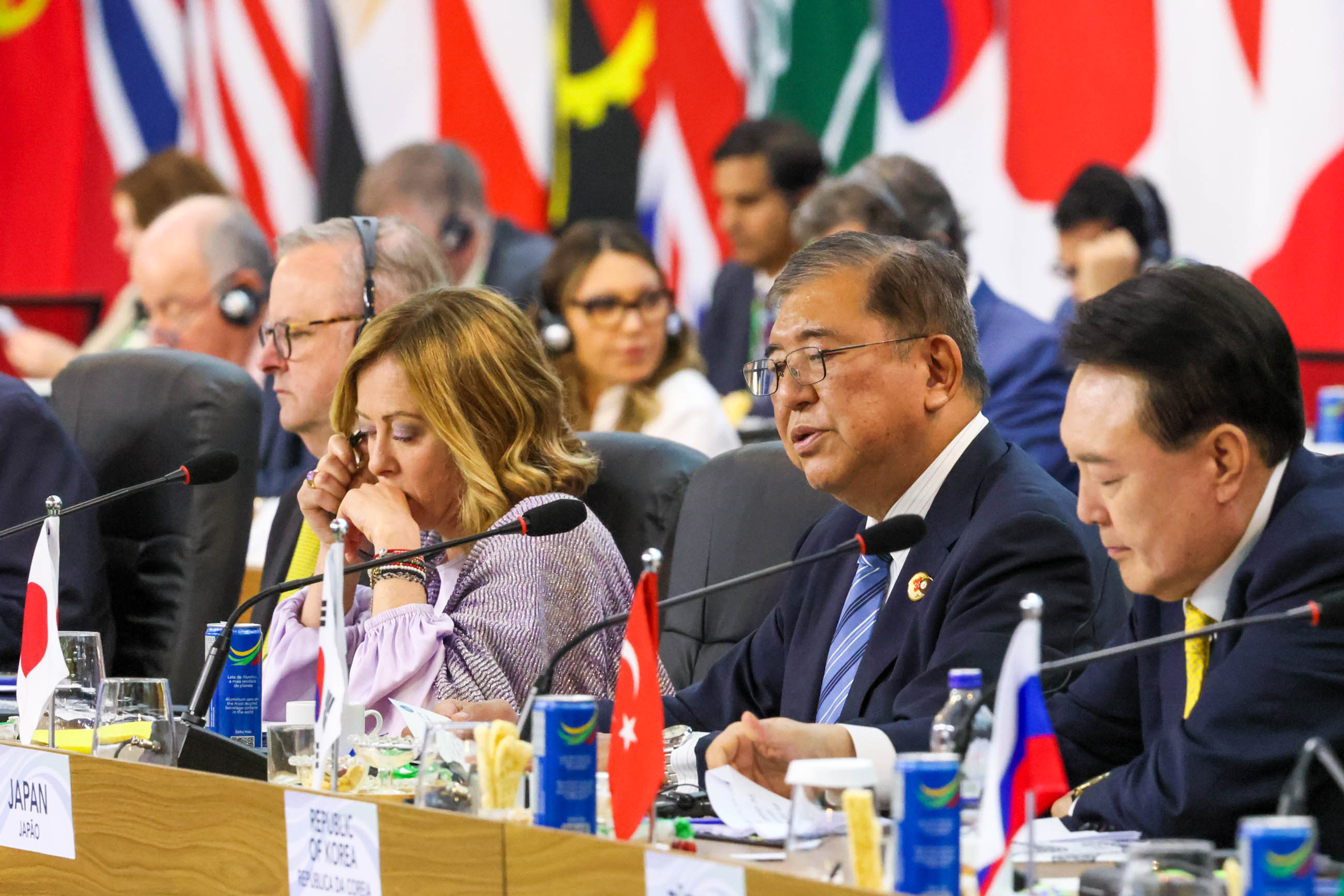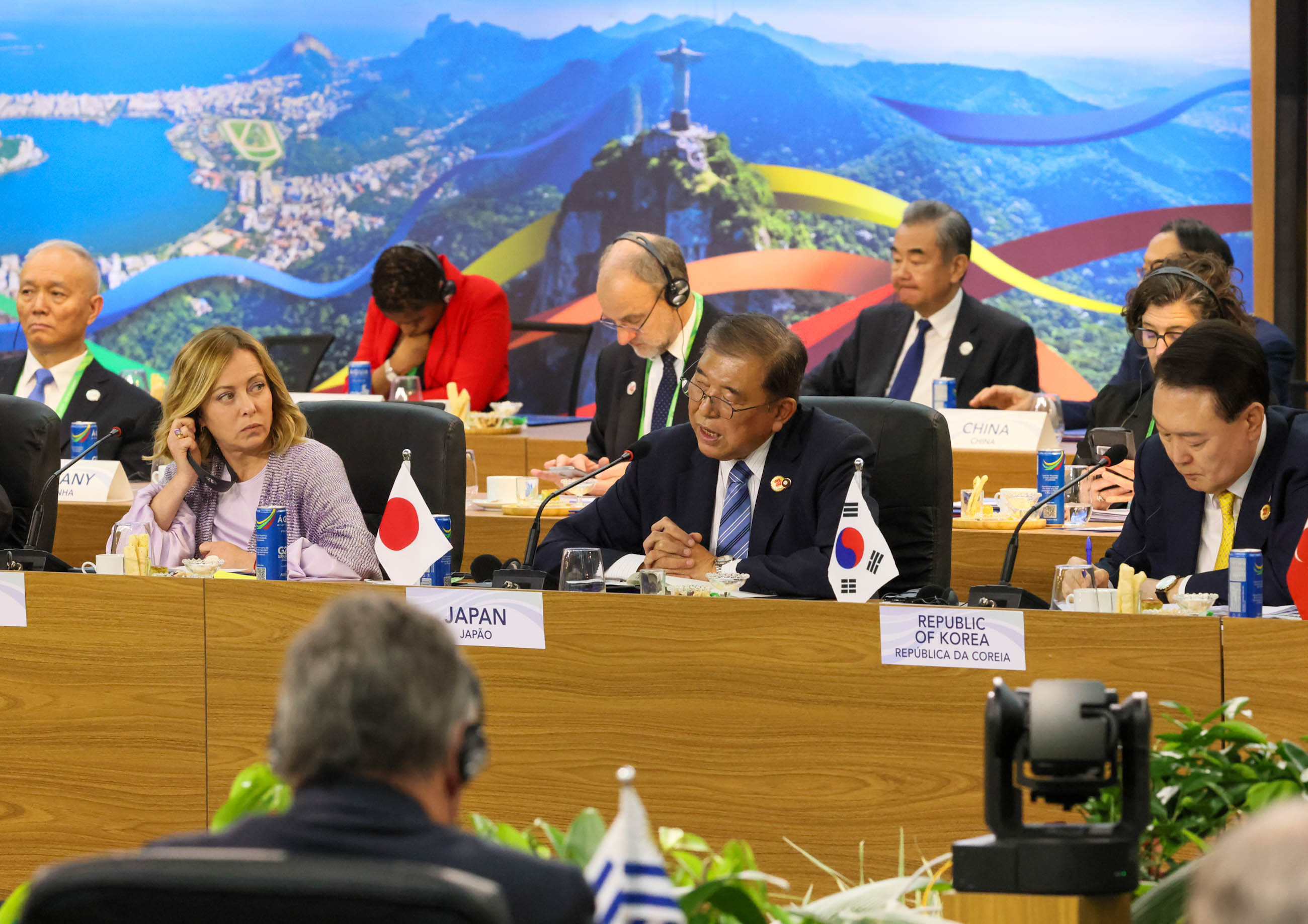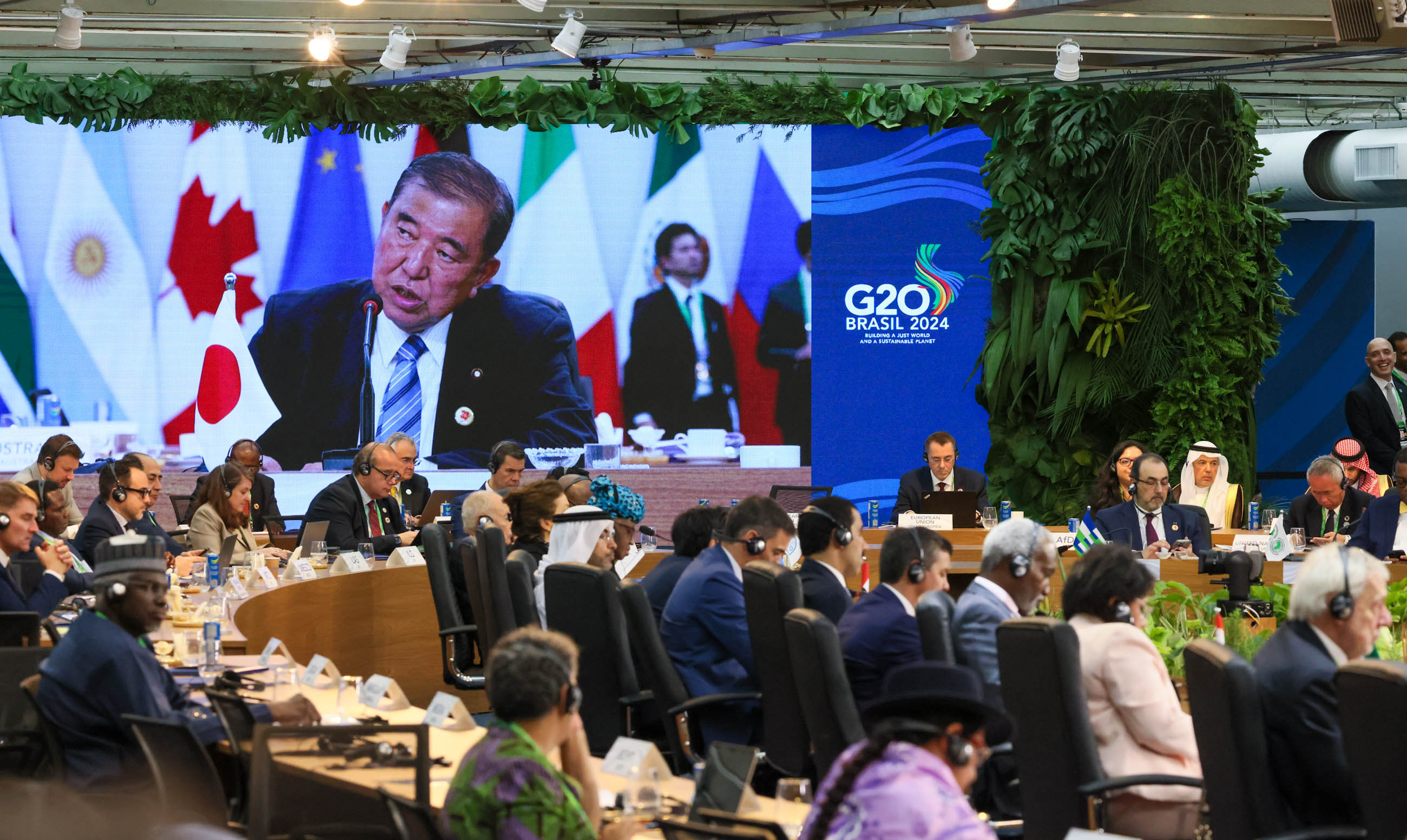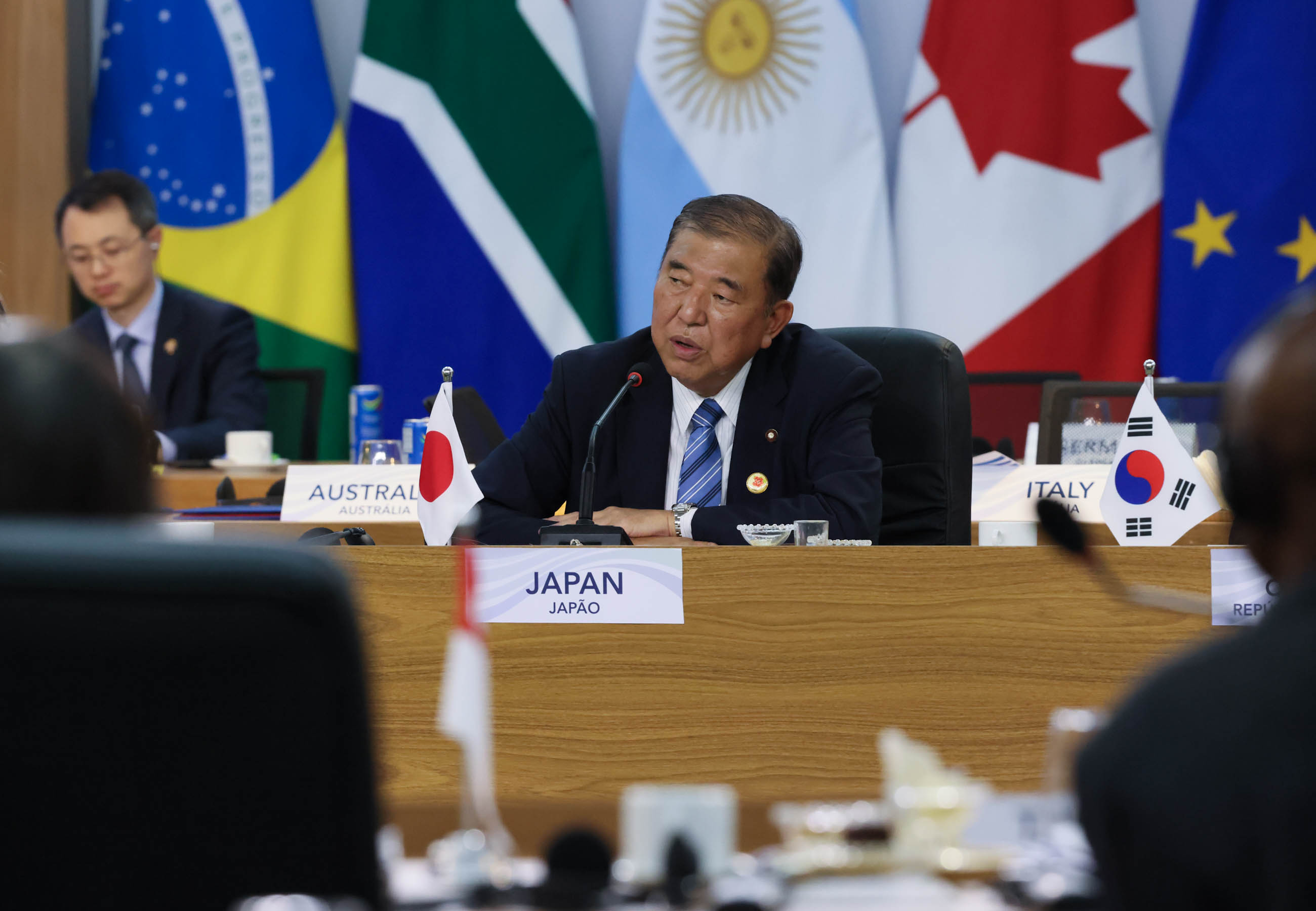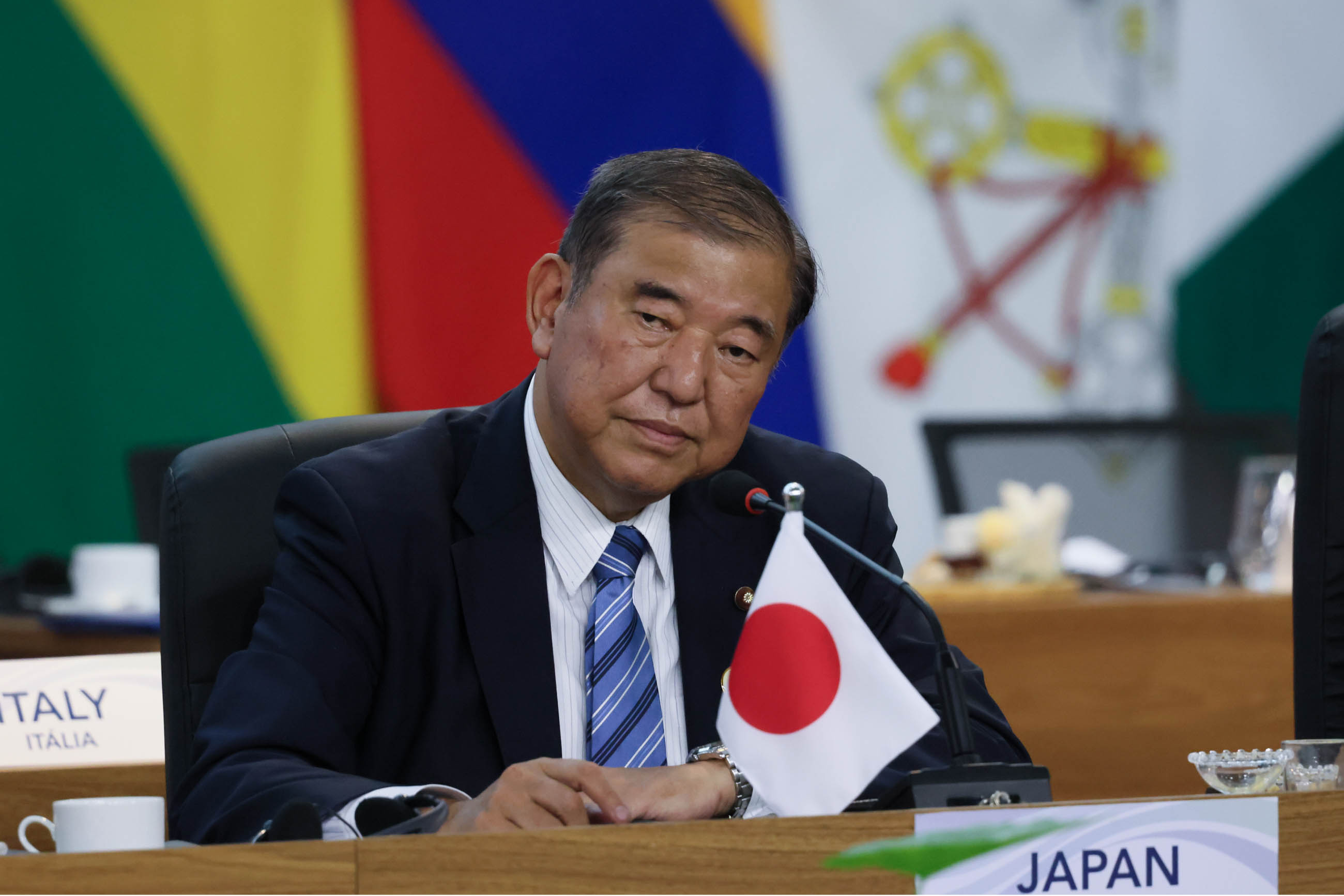G20 Rio de Janeiro Summit Meeting: First Day (Summary)
November 18, 2024
[Provisional Translation]
On November 18th local time (18th JST), the G20 Rio de Janeiro Summit was held in Rio de Janeiro, Brazil, hosted by Brazil as the G20 Presidency. It was chaired by H.E. Mr. Luiz Inácio Lula da Silva, President of the Federative Republic of Brazil, and Mr. ISHIBA Shigeru, Prime Minister of Japan, attended it. The overview of day 1 is as follows.
Throughout Sessions 1 and 2, with regard to the Russia's aggression against Ukraine, many members, including Japan, emphasized the importance of upholding the UN Charter and achieving a just and lasting peace in Ukraine. In addition, with regard to the increasingly tense situation in the Middle East, many members, including Japan, emphasised the need to improve the humanitarian situation and the need for maximum restraint and observance of international law by all parties in order to calm down the situation as soon as possible. In particular, in Session 1, it was emphasised that wars and conflicts are exacerbating hunger and poverty, and in Session 2, that the UN reform, including reform of the Security Council, is necessary, since the international community is not effectively addressing the situation in Ukraine and the Middle East. After the end of Session 2, the G20 Rio de Janeiro Leaders' Declaration was issued.
1. Session 1 “Fight against Hunger and Poverty”
(1) In this session, which started at 11:15 local time (23:15 JST) and lasted for approximately 4 hours and 15 minutes, participants discussed development issues with a focus on combating hunger and poverty. Prior to the session, the Global Alliance Against Hunger and Poverty was launched, in which Japan also participated. All members announced their participation in the Global Alliance Against Hunger and Poverty, emphasizing the importance of efforts to eradicate hunger and poverty. Several members also stressed the importance of food security and the establishment of sustainable and resilient food systems. In addition, it was pointed out that the G20 needs to share responsibility and take the lead in addressing global challenges to achieve sustainable development.
(2) In this session, Prime Minister Ishiba made the following remarks.
(i) The international community is currently facing urgent issues such as hunger and poverty, climate change, disasters and conflicts. In such a situation, the G20 needs to identify common grounds and points of agreement, rather than division and confrontation, and lead in solving these issues in a way that all members share responsibility.
(ii) Regarding the fight against hunger and poverty, Japan, based on the concept of human security, would like to eradicate hunger and poverty and realize a prosperous society where everyone can live happily with human dignity. In order to achieve this, the perspective of food security and building sustainable and resilient food systems is important, and Japan will also actively contribute to the Global Alliance Against Hunger and Poverty.
(iii) In the past five years alone, Japan has provided approximately US$15 billion in assistance to combat hunger and poverty. For example, long-standing development of the Cerrado region in Brazil has transformed a barren land into the world's largest soybean-producing region, which supports the world's food supply. We will also cooperate in the realization of sustainable agriculture, which converts degraded pastures into farmland without deforestation. In addition, Japan also focuses on building the capacity of small-scale farmers, and expands the same support to 69 countries around the world, mainly in Africa and Central and South America, with the aim of improving farming and cultivation skills focused on increase of sales. Furthermore, we would like to expand sustainable and highly productive agriculture, forestry and fisheries to new partners including countries in Central and South America and Africa, utilizing Japan’s advanced technology, including on the reduction of greenhouse gas emissions.
(iv) The Tokyo International Conference on African Development (TICAD), which Japan has organized since 1993, is an important occasion to highlight efforts to eradicate hunger and poverty. At TICAD to be held in Japan next August, we would like to work together with African countries to make further efforts to achieve quality growth.
(v) With regard to climate change, the G20, which accounts for around 80% of global greenhouse gas emissions, has a responsibility as a world leader to simultaneously realize climate action, economic growth, and energy security. It is important to formulate and implement an ambitious next Nationally Determined Contributions (NDCs) that include absolute emission reduction targets consistent with a 1.5°C target. Japan would like to achieve the common goal of net zero emissions by 2050, through various pathways, in line with national circumstances.
(vi) Regarding the environment, Japan will lead discussions toward the development of an international legally binding instrument on plastic pollution by the end of this year, with the ambition to reduce additional plastic pollution to zero by 2040.
(vii) In addition, Japan supports the “High-Level Principles on Bioeconomy” led by Brazil, from the perspective of achieving sustainable development.
(viii) Regarding disaster risk reduction, we urgently need to address the large-scale natural disasters that strike frequently around the world, such as earthquakes and typhoons. In order to protect the people from disasters, it is essential to make thorough preparations regularly at ordinary times, and Japan is aiming to establish the Disaster Management Agency with a minister in charge and disaster risk reduction experts. Additionally, we would like to continue working with the G20 members to steadily implement the Sendai Framework for Disaster Risk Reduction and strengthen disaster risk reduction measures. Furthermore, we would like to promote the sharing of knowledge and experience regarding improving the environment of evacuation shelters, ensuring stockpiles, and improving cooperation with the private sector, such as volunteers.
2. Session 2 “Reform of the Global Governance Institutions”
(1) In this session, which started at 14:15 local time (2:15 19th JST) and lasted approximately 3 hours 15 minutes, participants discussed global governance reform such as the UN reform including the revitalization of the UN General Assembly and the Security Council reform, MDB evolution, WTO reform and international cooperation on artificial intelligence (AI).
In this session, all members emphasized the need for global governance reform to solve the issues facing the international community, and many members pointed out the importance of cooperation towards the international governance of AI.
(2) Prime Minister Ishiba made the following remarks.
(i) The world now stands at a historical inflection point. Japan would like to emphasize that the key to international cooperation in these turbulent times is to maintain and strengthen a free and open international order based on the rule of law and to build global governance with shared responsibility.
(ii) Russia's aggression against Ukraine is a clear challenge to the international order based on the rule of law. Japan expresses serious concern about increasing military cooperation between North Korea and Russia. This is particularly troubling because of the ongoing advancement of North Korea’s nuclear and missile activities in violation of UN Security Council resolutions. It is necessary to achieve a just and lasting peace in Ukraine as soon as possible.
(iii) Japan expresses strong concern over the current tense situation and critical humanitarian situation in the Middle East. To calm down the situation as soon as possible, we also reiterate our call for a ceasefire in Gaza and the immediate release of hostages, and urge all parties to exercise utmost restraint and comply with international law, including international humanitarian law.
(iv) As the UN Security Council is unable to respond to contemporary challenges, the international community concurred on the urgent need of its reform at the Summit of the Future. Japan supports the expansion of both permanent and non-permanent categories of its membership. Concrete discussions are needed as soon as possible, and Japan will contribute to strengthening the functions of the UN, including reform of the UN Security Council and will also examine the role that the United Nations General Assembly should fulfill.
(v) Japan welcomes the MDB (Multilateral Development Bank) Roadmap adopted by the Finance Ministers. In MDB evolution, it is important to maximize the use of each institution's existing equity capital and create additional lending headroom. We have contributed to this effort through the provision of guarantees to the World Bank. It is also important for MDBs to support borrowing countries in strengthening the private capital and domestic resource mobilization. In addition to MDBs, donor countries play an essential role in supporting low-income countries, and we have long played a role as a major donor country in the Asian Development Fund and the International Development Association. Regarding debt issues in developing countries, it is necessary to speed up the debt restructuring process under the G20 Common Framework and further improve debt transparency. Japan has also taken the lead in the debt restructuring for Sri Lanka, which was the first case of debt restructuring for middle-income countries in cooperation with emerging creditor countries. We will continue to provide necessary support to developing countries to help them resolve the challenges they face.
(vi) Regarding WTO reform, in the increasingly digitalized world of international trade, WTO reform is an urgent issue, and we would like the G20 to give political impetus together. In particular, the restoration of the function of the dispute settlement system is an urgent matter. It is also important for the WTO to steadily achive results for the challenges before it.
(vii) It is also important to respond to new challenges. To achieve safe, secure, and trustworthy AI, Japan is working to expand the implementation of the International Guiding Principles and the International Code of Conduct developed under the “Hiroshima AI Process.” At the same time, addressing the digital divide is also important. We intend to continue to support human resource development and institution building in developing countries, and would like to cooperate at the G20 as well.
(viii) There are many areas where the G20 should take the lead in international cooperation, and its role is becoming even more important. Japan would like to build global governance that transcends confrontation and in which all countries share responsibility.
(Reference) G20 Rio de Janeiro Summit
(1) Schedule
-Monday, November 18
Session 1 “Fighting against Hunger and Poverty”
Session 2 “Reform of the Global Governance Institutions”
-Tuesday, November 19
Session 3 “Sustainable Development and Energy Transition”
(2) Participating countries and international organizations
i: G20 member countries
Japan, Brazil (Presidency), India, Argentina, Australia, Canada, China, France, Germany, Indonesia, Italy, Mexico, Republic of Korea, Russia, Saudi Arabia, South Africa, Turkey, United Kingdom, United States, European Union
ii: Invited countries
Angola, Bolivia, Chile, Colombia, Egypt, Malaysia, Mozambique, Nigeria, Norway, Paraguay, Portugal, Qatar, Singapore, Spain, Tanzania, United Arab Emirates, Uruguay, Vietnam, Vatican.
iii: International organizations
African Development Bank (AfDB), Asian Infrastructure Investment Bank (AIIB), Latin American Development Bank (CAF), Food and Agriculture Organisation of the United Nations (FAO), Financial Stability Board (FSB), Inter-American Development Bank (IDB), International Labour Organisation (ILO), International Monetary Fund (IMF), League of Arab States (LAS), New Development Bank (NDB), United Nations (UN), UN Conference on Trade and Development (UNCTAD), UN Educational, Scientific and Cultural Organisation (UNESCO), World Bank (WB), World Health Organisation (WHO), World Trade Organisation (WTO)
